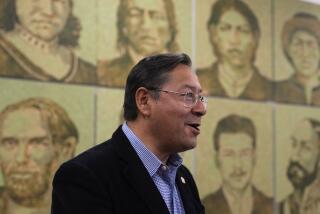Leader Wins Tussle Over Arrest of Ex-General but Imperils Ties to Military
- Share via
LIMA, Peru — President Alberto Fujimori celebrated a holiday honoring the Peruvian army this week amid the usual pomp, circumstance and respectful exchanges with the chief of the armed forces.
The apparent harmony at this year’s ceremony drew unusual attention, however, because it came after a confrontation between Fujimori and the military that caused one of Peru’s worst political crises in four years.
The president and the fragile Peruvian democracy emerged the apparent winners. But Fujimori’s alliance with the military and intelligence service, which has anchored his often-authoritarian rule, was profoundly shaken. The future looks uncertain and likely to test the president’s political agility.
“We are entering a very interesting era,” said Gustavo Gorriti, a well-known Peruvian journalist and critic of Fujimori. “The internal equilibrium of power shifted. Fujimori is going to try to take advantage of the confrontation to cement his position, but it will not be easy.”
The spark for this clash was the arrest here Nov. 26 of Rodolfo Robles, a retired general and human rights crusader who recently returned from three years in exile in Argentina. Robles was grabbed by military intelligence agents as he walked to a newspaper stand.
The arrest followed the former general’s allegations that the bombing of a television station in October was carried out by a military death squad that Robles blames for the slaying of nine students and a professor at La Cantuta University in 1992. Robles was charged with criticizing the armed forces.
The military rejected a civilian judge’s order to release Robles, who the court said could not be charged under military law because he is retired. Then Fujimori stepped in, declaring that the arrest was improper and saying he would pardon Robles if the former general was not set free.
It was an extraordinary turnabout. Since 1992, when the president deployed troops to temporarily shut down Congress and assume emergency powers, Fujimori has been a staunch ally of Gen. Nicolas Hermoza, the military chief of staff, and Vladimiro Montesinos, a secretive presidential advisor who is the unofficial head of the intelligence service. The trio is considered the center of real power in a nation whose legislature and judiciary were weakened during a long war against rebels.
Despite the president’s words and public outcry, the military did not back down. There were rumors of ominous tank movements. The magazine Caretas wrote that the president seemed a “prisoner of military decisions.”
Fujimori resolved the standoff by turning to Congress, the very institution he dissolved in his 1992 “self-coup.” His parliamentary majority last week passed a hurried law granting amnesty to retired officers who criticize the armed forces. Robles was released and resumed his verbal attacks.
On the surface, it was a triumph for free speech and democracy. Fujimori said his action was “precisely what gives balance to a democratic system.” The denouement also revealed apparent disarray in the ruling alliance of Fujimori, the military and intelligence service--an alliance that critics say has blocked investigations of human rights crimes and corruption, including recent allegations that Montesinos protected a drug lord.
“In past years, they did whatever they wanted,” said Fernando Rospigliosi, a political commentator. “But not this time. The power of the government has deteriorated.”
Fujimori did not punish the defiant military officials, however, suggesting that he remains uncomfortably dependent on them, said Lourdes Flores, an opposition congresswoman.
“This alliance has been strained, but it does not break,” she said. “I presume Fujimori wants to break it, but he apparently does not dare. . . . I think he believes that the military is his support and guarantee in any kind of scenario.”
Since leading the successful war against Maoist rebels and winning reelection last year, Fujimori’s populist appeal has faltered. His rating in leading public opinion polls has sunk below 50%, a casualty of economic doldrums and scandals such as the Montesinos affair.
The release of Robles allowed Fujimori to cast himself as a decisive reformer, but it heralds the potential for further conflict, according to Gorriti.
Fujimori’s ultimate objective, analysts say, is to run for a third term in 2000.
Special correspondent Mariana Sanchez Aizcorbe in Lima contributed to this report.
More to Read
Sign up for Essential California
The most important California stories and recommendations in your inbox every morning.
You may occasionally receive promotional content from the Los Angeles Times.













